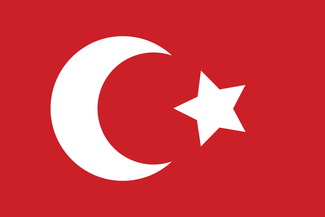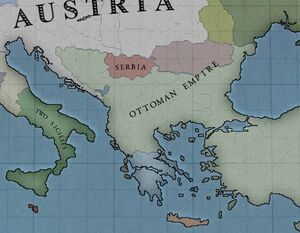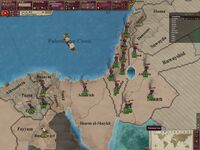| 奧斯曼帝國 | |
|---|---|
 | |
| 政府類型 | Absolute Monarchy |
| 執政黨 | Janitschars (reactionary) |
| 首都 | Istanbul (ID 860) |
| 人口 | 5.1 Million |
| 主體民族 | Turkish |
| 被接受民族 | |
| 識字率 | 7.8% |
| 國家價值觀 | Order |
| 科研學派 | Military-Industrial Complex |
| 地位 | Great power |
人們以為財富和權力是最偉大的天道,但在這個世界上健康的魔力才是最好的國家。人們所說的君權只是世俗的吵鬧和不斷的征伐;崇拜真主才是至尊的寶座、最幸福的財寶。——蘇萊曼一世
The people think of wealth and power as the greatest fate, But in this world a spell of health is the best state. What men call sovereignty is a worldly strife and constant war; Worship of God is the highest throne, the happiest of all estate's. - Suleiman I
奧斯曼帝國的光輝歲月已經結束很久了。被停滯不前、腐敗叢生、獨立狂潮接連打擊與外界的兩位強鄰窺伺下,這位「西亞病夫」正處在一個悲慘時期。帝國只剩他曾經的軀殼,內部唯能看見幻影;更為糟糕的是,他們稱之為"附庸"的![]() 埃及已經宣告獨立,
埃及已經宣告獨立,![]() 的黎波里的統治者也不甘落後。 為了重拾奧斯曼帝國的榮光,恢復立法者蘇萊曼大帝的力量,他需要再次征服這些不從的國家, 組建西式陸軍,並最終實現帝國歷代蘇丹數百年之夢:征服維也納這座不落之城,建立一個從英吉利海峽直抵黑海的普世帝國。
的黎波里的統治者也不甘落後。 為了重拾奧斯曼帝國的榮光,恢復立法者蘇萊曼大帝的力量,他需要再次征服這些不從的國家, 組建西式陸軍,並最終實現帝國歷代蘇丹數百年之夢:征服維也納這座不落之城,建立一個從英吉利海峽直抵黑海的普世帝國。
「奧斯曼主義」——一個包含多種和平共存的文化和宗教的理念正在死去。統一伊斯蘭和恢復哈里發的想法正在消失。武裝部隊的狀況非常糟糕,希臘北部和巴爾幹半島的民族主義者威脅要將土耳其帝國分裂。如果有人敢於承擔國家的重任,就要知道,這將是一條漫長、艱難、血腥的光榮之路,就像400年前奧斯曼帝國最初的擴張時期一樣。
事件 與 決議
決議
奧斯曼帝國有兩個獨特決議:
事件
工業
奧斯曼開局沒有工業化;然而開局執政黨的經濟政策是國家資本主義,意味着他可以開局建造工廠。如果奧斯曼人開局開始工業化,那些工廠將極可能虧損,需要國家補貼並給工廠中的人群們極低的收入。奧斯曼的工業科技相當孱弱,識字率也很低,嚴重遲滯了人口轉化為職員與資本家的進程。取決於工廠的效率與產量,帝國的工業化進程將十分緩慢,直到70年代。
對於奧斯曼而言,最佳的工業化時機是從70年代開始。工廠生產 ![]() 烈酒和
烈酒和 ![]() 果酒 總是有利可圖, 並且工廠生產的
果酒 總是有利可圖, 並且工廠生產的 ![]() 水泥和
水泥和 ![]() 零件 經常在工業擴張的後期派上用場。 在建立了核心工業基礎之後,在中期轉向干預主義政黨,在後期轉向自由放任的經濟政策,將有助於成立一個安拉的工業帝國。在遊戲結束時,雖然比較困難,但仍可能獲得世界第一的工業排名。
零件 經常在工業擴張的後期派上用場。 在建立了核心工業基礎之後,在中期轉向干預主義政黨,在後期轉向自由放任的經濟政策,將有助於成立一個安拉的工業帝國。在遊戲結束時,雖然比較困難,但仍可能獲得世界第一的工業排名。
奧斯曼帝國內部沒有充足的煤炭資源。 ![]() 煤炭對如此多的工業過程至關重要,精明、前瞻的奧斯曼蘇丹有必要尋求獲得更多。這可以通過征服產煤大國或將他們納入勢力範圍來實現。對於奧斯曼大蘇丹來說,這必須是遊戲早期到中期的優先事項。
煤炭對如此多的工業過程至關重要,精明、前瞻的奧斯曼蘇丹有必要尋求獲得更多。這可以通過征服產煤大國或將他們納入勢力範圍來實現。對於奧斯曼大蘇丹來說,這必須是遊戲早期到中期的優先事項。
只有在工業國家的識字率達到40%之後才會出現職員。奧斯曼帝國工業和技術落後的所有問題最終都會得到解決。
預算與稅收
奧斯曼早期的預算不佳。由銀行破產導致的威望損失可以輕易的把奧斯曼打成次強。 In order to avoid this fate, a combination of high taxes on POPs and high tariffs will be needed until the budget can be stabilized. Adjustments must be made to both the revenue and the spending sides of the ledger. The Ottoman Navy is far larger than needed to deal with the Egyptian navy, but not enough to fight the UK or Russia. A priority for budget savings can be the Ottoman starting fleet.
The most important investments are:
- Education must be fully funded to increase literacy, and
- Administration should be fully funded to increase revenues.
Literacy and taxes are the weakest point of the Ottoman state, and funding should be prioritized on Education and Administration. In time, the situation can be improved. But savings must be found quickly.
Problems with Population
The Ottoman Empire begins the game with the lowest population among the Great Powers as well as being the most illiterate and generally backwards. ![]() Persia, in general, offers the best growth opportunities and the most likely regions to be converted into states due to the high literacy rates. In response to the overall low population of the empire, focusing on the chemistry technology tree will boost population. and implementing health care reforms early are critical components to building the native Turkish population of craftsmen and soldier POPs.
Persia, in general, offers the best growth opportunities and the most likely regions to be converted into states due to the high literacy rates. In response to the overall low population of the empire, focusing on the chemistry technology tree will boost population. and implementing health care reforms early are critical components to building the native Turkish population of craftsmen and soldier POPs.
The Ottoman weakness in overall population (and a population divided among many nationalities, which further diminishes province-specific soldier POPs), means that the Ottoman Empire ought not to take risks with its armies that do not have a strong payoff. A long war with either Austria or Russia (or a crisis war where the Ottoman ruler does not control the peace agreement), can result in heavy losses of scarce POPs for little to no gain. So be careful about engaging in wars with Austria and Russia until The Ottomans have adequate strength in numbers. Even a carefully planned war against nearby uncivs Persia or Egypt will see the Ottoman army take more attrition losses than combat losses, and often the losses cannot be replaced, and the army sees brigades disbanded.
National Focus
There are two schools of thought with respect to initial National Foci; more ![]() clergy to combat the problem of slow research and poor literacy and more
clergy to combat the problem of slow research and poor literacy and more ![]() bureaucrats so as to improve tax efficiency. Remember that 2% clergy gives the maximum research points, but 4% clergy will increase literacy the fastest. Since the Ottomans have, by far, the lowest literacy of any GP, clergy is a sound first national focus.
bureaucrats so as to improve tax efficiency. Remember that 2% clergy gives the maximum research points, but 4% clergy will increase literacy the fastest. Since the Ottomans have, by far, the lowest literacy of any GP, clergy is a sound first national focus.
Technology
The Ottomans begin the game at a severe technological disadvantage. In fact, aside from a few techs, they are no better than the uncivilized neighbor Persia, and with lower literacy (8%). Furthermore, the Ottoman Empire starts with the lowest literacy of any GP, and with fewer clerks. Research points are desperately needed. This means that one will be spending a lot of time catching up with other GPs in Europe in terms of technology. Therefore, it is useful to get the clergy population to 4% for the maximum literacy increase.
Important technologies to research:
- Early Game: Idealism (wait until 1840), Medicine, Practical Steam Engine, Early Classical Theory.
- Mid Game: Nationalism and Imperialism, Machine Guns
- Late Game: Mostly industry focus.
- Overall categories: Philosophy research; Social Thought until Biologism is discovered; Political Thought through Nationalism and Imperialism.
Of course, culture techs which provide increased research points, literacy and NFs are very important. Army techs are important to preserve the forces while still managing to expand. Industry and commerce techs which improve factory efficiency, taxation and administrative efficiency are also important. The mining and farming efficiency techs (located in the Market Functionality section of Commerce, and the Power section of Industry) are very helpful in getting income.
The biggest choices that the Ottoman sultan must make is what not to research. The Ottoman Empire must postpone research into non-essential areas until it has modernized its society, economy and military.
Colonization
Without adequate naval bases and ![]() commerce raiders/
commerce raiders/![]() steamers, the colonization of Africa will be hampered. The Empire is so close to that vast continent, and when Colonial Negotiations occur, the Ottoman Empire has much to gain if it properly positioned; and this requires Naval Doctrine research. Africa is a source of prestige, resources, and strength. The Ottoman Empire should share in this bounty.
steamers, the colonization of Africa will be hampered. The Empire is so close to that vast continent, and when Colonial Negotiations occur, the Ottoman Empire has much to gain if it properly positioned; and this requires Naval Doctrine research. Africa is a source of prestige, resources, and strength. The Ottoman Empire should share in this bounty.
Politics
The Ottoman Empire has four feasible political parties for the majority of the game:
- Janitschars: Best for the early game (first 10 years or so). This party allows the player to kickstart Ottoman industry by building factories in some of the most populous states before Capitalists exist in large numbers.
- Imperial Party: A slightly more business friendly government with more tolerant religious views.
- People's Union: A relatively liberal party with the advantage of Full Citizenship, but the disadvantage of Pacifism.
- Radical Party: This is a useful party in late game, where the laissez faire capitalists go crazy in factory building.
Diplomacy
Diplomacy is needed to (1) obtain allies for defensive and offensive purposes; (2) amass nations in the Ottoman sphere of empire, which will prevent the expansion of other powers, and (3) ensure that adequate resources are available through the Ottoman sphere of influence. This becomes more important in the later game, when bottlenecks appear in certain resources like rubber, oil, coal and iron. The Ottoman sphere can be expanded faster, if the empire places foreign investment in its sphere and it helps with the weak industrial score early on. It can be helpful to make those foreign investments in railroads, so that the Ottoman sphere is protected, and the industrial score increased.
Alliances
The Ottoman Empire needs alliances primarily due to the threat from the Russian Empire, and to a lesser extent other large GPs. An important ally to secure early is ![]() Austria or
Austria or ![]() Prussia who are able to field a powerful army in central Europe from the beginning of the game.
Prussia who are able to field a powerful army in central Europe from the beginning of the game.
Other alliances in the early game came include ![]() Two Sicilies, and possibly even
Two Sicilies, and possibly even ![]() France or the
France or the ![]() United Kingdom (particularly helpful in a Crimean War situation). The Ottoman Empire should raise
United Kingdom (particularly helpful in a Crimean War situation). The Ottoman Empire should raise ![]() Russia to maximum relations to help avoid war and it is possible to enter an alliance with Russia, which is the best alliance the Ottoman Empire could have. Until its grows sufficiently strong, the Ottoman Empire is simply not powerful enough to go to war alone with a major power. It is possible to defeat Russia in a war. However, the losses in POPs compared to the gains in terms of poor, low-literacy Russian provinces simply is not worth it.
Russia to maximum relations to help avoid war and it is possible to enter an alliance with Russia, which is the best alliance the Ottoman Empire could have. Until its grows sufficiently strong, the Ottoman Empire is simply not powerful enough to go to war alone with a major power. It is possible to defeat Russia in a war. However, the losses in POPs compared to the gains in terms of poor, low-literacy Russian provinces simply is not worth it.
Sphere of Influence
The Ottoman Empire begins the game with three nations in its Sphere of Influence: Serbia, Wallachia and Moldavia. There are several neighbors that are not worth conquering because they would further lower literacy in the empire, cost some infamy to conquer and do not provide significant population centers. There are several opportunities for expanding the sphere:
- Early competition:
 Algeria and Two Sicilies
Algeria and Two Sicilies - European Sphere:
 Montenegro
Montenegro - African Sphere:
 Tunis and
Tunis and  Ethiopia
Ethiopia - Arabian Sphere:
 Nejd and
Nejd and  Hedjaz
Hedjaz
Expect that Montenegro will be the subjects of attempts by other powers, including France, the UK, and Germany, to get them into their sphere. Looking at Montenegro's population, it is a fairly minor and insignificant place. Moldavia and Wallachia are satellites, and therefore one have an advantage. They also get some good resources later on, including oil. They are excellent members of the Ottoman sphere.
One way of looking at the Ottoman sphere of influence is to review what the sultan's empire needs for industrialization. ![]() coal is needed, so sphering coal-heavy uncivs makes sense. These include
coal is needed, so sphering coal-heavy uncivs makes sense. These include ![]() Korea,
Korea, ![]() Qinghai,
Qinghai, ![]() Manchuria and Persia, among others. Naturally, future
Manchuria and Persia, among others. Naturally, future ![]() and
and ![]() producing regions and nations should be targeted, for influence, conquest, and investment. In collecting a sphere of influence, be sure to avoid trouble with Russia until the Ottoman army can quickly handle the military situation, either alone or with allies.
producing regions and nations should be targeted, for influence, conquest, and investment. In collecting a sphere of influence, be sure to avoid trouble with Russia until the Ottoman army can quickly handle the military situation, either alone or with allies.
Austria and Prussia typically spend time influencing German minor states. The Ottoman Empire can spend its diplomatic points amassing a respectable Asian and South American sphere, and other nations in Europe. But early struggles with Russia are best avoided.
Wars
Tripoli
The game begins with a war against Tripoli. This can be finished within about a year with the local Libyan forces, but it can be considered to move more troops over in order to finish the war quickly.
Egypt
The most obvious target for Ottoman aggression is Egypt for a number of reasons: First, it has Ottoman cores. Second, Egypt has a large population that can be brought under control. Third, Egypt owns the land for the future Suez Canal. Fourth, Egypt has rubber in the south that will be useful in the late-game industrial economy. Fifth: It is a good gateway to Scramble of Africa. Last, Great Power interest in Egypt intensifies, making it harder to dominate Egypt. Egypt can be annexed through a series of three wars:
- The first war is arguably the most challenging: all Ottoman forces should be brought into the battle. Irregulars should serve only as rear-guards for territory occupations, while infantry and cavalry are used as the front-line armies. Also it´s possible to wait for an eventual war between Ethiopia and Egypt or Two Sicilies (not advisable) which likes to conquer
 Crete and the Sidi Barrani region. This war can win most Ottoman cores on Egypt, in addition to the Suez Region. It is wise to leave two core provinces out of the peace deal, thus providing easy future casus belli.
Crete and the Sidi Barrani region. This war can win most Ottoman cores on Egypt, in addition to the Suez Region. It is wise to leave two core provinces out of the peace deal, thus providing easy future casus belli. - The second war can be used to take the majority of Egypt's remainder, though here it is wise to balance territorial conquest to prevent too much infamy. A generally safe move is to exclude Egypt's poorest regions such as Kordofan and Farafra Regions. This war is significant because it will provide the Ottoman Empire with contiguous land spanning from Tripoli through to Suez and onto Istanbul.
- The third war will provide the opportunity to completely annex Egypt, a worthwhile endeavor for the sake of the populous Giza region.
Persia
Persia is the best target for Ottoman expansionism and should be the priority. Tabriz is a highly appealing region: with a population of over 350,000 people at the start of the game (easily growing to over 2.5 million by the end of the game), it also offers a reasonable number of Clergymen, Soldiers and Officers. Russia have a friendly opinion of Persia, which means that one have to watch their actions and avoid conflict with them. It might be the best choice to remove the Russian influence beforehand.
Tunis
Tunis provides a populous region with a reasonable number of Clergy and Soldiers. France will likely declare war within the first few months, thus the war must be waged early. This is a fairly easy war to win. The key is to use troops from the European portion of the Empire to ensure a rapid occupation. Unfortunately, due to low literacy, it is extremely difficult to turn Tunisia into a state. Therefore, this is a questionable goal.
Greece
![]() Greece is a tough challenge: firstly UK must lose its influence. Secondly, due to being a civilized nation, annexation will cost a lot of infamy. On top of that, the Greeks will start a lot of crises.
Greece is a tough challenge: firstly UK must lose its influence. Secondly, due to being a civilized nation, annexation will cost a lot of infamy. On top of that, the Greeks will start a lot of crises.
Colonization
The Ottoman Empire is in a very good position to colonize most of Africa. With fast research and an aggressive posture, most of Africa can be successfully colonized. The addition of an African empire is very important to Ottoman designs. It is contiguous to Ottoman territory, has large resources for the taking, and the prestige gained can be very helpful to a struggling Ottoman Empire.
If Egypt or Ethiopia is conquered, some regions can be colonised early on without the risk of interference from other nations (Darfur, and the uncolonised regions of Ethiopia)
One does however need to invest in a big fleet, but The Ottoman Empire has an abundance of coast to do so.

